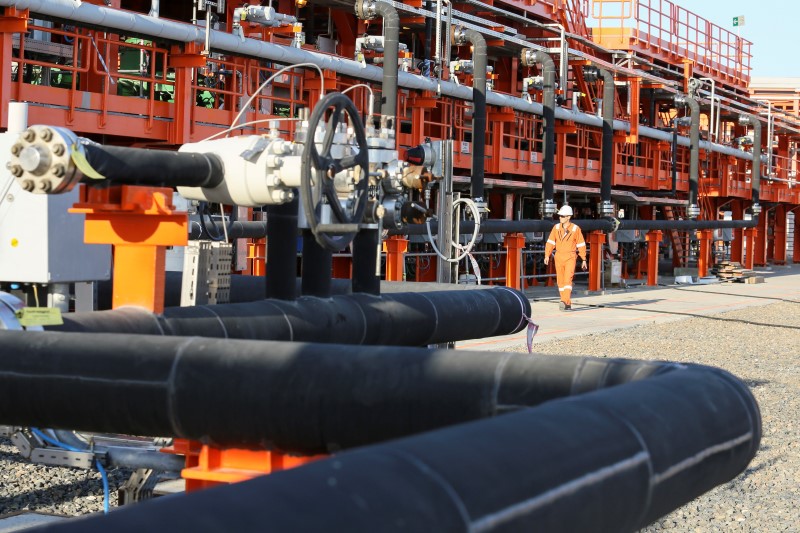* Storm shuts 84% of Gulf production, 12% U.S. refining
capacity
* Refiners currently assessing damage to plants
(New throughout, updates prices, market activity and comments
to settlement)
By Laura Sanicola
NEW YORK, Aug 27 (Reuters) - Oil prices eased on Thursday as
the market expected a quick recovery for production platforms
shuttered ahead of a hurricane that churned through the Gulf of
Mexico and slammed Louisiana.
Brent crude LCOc1 futures for October, which expire on
Friday, fell 55 cents, or 1.2%, to settle at $45.09 a barrel.
U.S. West Texas Intermediate (WTI) crude CLc1 futures fell 35
cents or 0.8% to $43.04 a barrel.
The storm hit Louisiana early Thursday with 150
mile-per-hour (240 kph) winds, damaging buildings, knocking down
trees and cutting power to more than 400,000 people in Louisiana
and Texas. Its storm surge was less than predicted, sparing
inland plants from feared flooding. Oil producers on Tuesday had shut 1.56 million barrels per
day (bpd) of crude output, or 84% of the Gulf of Mexico's
production, evacuating 310 offshore facilities. BP said Thursday it was already preparing to return to its
company-operated facilities in the deepwater Gulf of Mexico to
inspect for any potential damage from the storm.
At the same time, refiners that convert nearly 2.33 million
bpd of crude oil into fuel, and account for about 12% of U.S.
processing, halted operations. "On the one hand refinery shutdowns reduced the demand for
crude oil, but at the same time Gulf of Mexico production was
shut in, nearly offsetting each other," said Andrew Lipow,
president of Lipow Oil Associates in Houston.
Exxon Mobil Corp XOM.N said it was contacting employees of
its 369,000 barrel-per-day oil refinery and chemical plant in
Beaumont, Texas, and preparing a preliminary tally of damages.
The large plant was one of six plants along the Gulf Coast's
refinery row that shut this week ahead of the storm.
"These guys have gone through these drills many times," said
Jennifer Rowland, senior analyst at Edward Jones in St. Louis.
"They know how to turn those units down and get them back up
within a number of days...it shouldn't be that big of an
impact,” she added.
- English (USA)
- English (UK)
- English (India)
- English (Canada)
- English (Australia)
- English (South Africa)
- English (Nigeria)
- Deutsch
- Español (España)
- Español (México)
- Français
- Italiano
- Nederlands
- Português (Portugal)
- Polski
- Português (Brasil)
- Русский
- Türkçe
- العربية
- Ελληνικά
- Svenska
- Suomi
- עברית
- 日本語
- 한국어
- 简体中文
- 繁體中文
- Bahasa Indonesia
- Bahasa Melayu
- ไทย
- Tiếng Việt
- हिंदी
UPDATE 8-Oil prices slip as Hurricane Laura's blow unlikely to have sustained impact
Published 08/27/2020, 10:31 AM
Updated 08/28/2020, 04:00 AM
UPDATE 8-Oil prices slip as Hurricane Laura's blow unlikely to have sustained impact

Latest comments
Install Our App
Risk Disclosure: Trading in financial instruments and/or cryptocurrencies involves high risks including the risk of losing some, or all, of your investment amount, and may not be suitable for all investors. Prices of cryptocurrencies are extremely volatile and may be affected by external factors such as financial, regulatory or political events. Trading on margin increases the financial risks.
Before deciding to trade in financial instrument or cryptocurrencies you should be fully informed of the risks and costs associated with trading the financial markets, carefully consider your investment objectives, level of experience, and risk appetite, and seek professional advice where needed.
Fusion Media would like to remind you that the data contained in this website is not necessarily real-time nor accurate. The data and prices on the website are not necessarily provided by any market or exchange, but may be provided by market makers, and so prices may not be accurate and may differ from the actual price at any given market, meaning prices are indicative and not appropriate for trading purposes. Fusion Media and any provider of the data contained in this website will not accept liability for any loss or damage as a result of your trading, or your reliance on the information contained within this website.
It is prohibited to use, store, reproduce, display, modify, transmit or distribute the data contained in this website without the explicit prior written permission of Fusion Media and/or the data provider. All intellectual property rights are reserved by the providers and/or the exchange providing the data contained in this website.
Fusion Media may be compensated by the advertisers that appear on the website, based on your interaction with the advertisements or advertisers.
Before deciding to trade in financial instrument or cryptocurrencies you should be fully informed of the risks and costs associated with trading the financial markets, carefully consider your investment objectives, level of experience, and risk appetite, and seek professional advice where needed.
Fusion Media would like to remind you that the data contained in this website is not necessarily real-time nor accurate. The data and prices on the website are not necessarily provided by any market or exchange, but may be provided by market makers, and so prices may not be accurate and may differ from the actual price at any given market, meaning prices are indicative and not appropriate for trading purposes. Fusion Media and any provider of the data contained in this website will not accept liability for any loss or damage as a result of your trading, or your reliance on the information contained within this website.
It is prohibited to use, store, reproduce, display, modify, transmit or distribute the data contained in this website without the explicit prior written permission of Fusion Media and/or the data provider. All intellectual property rights are reserved by the providers and/or the exchange providing the data contained in this website.
Fusion Media may be compensated by the advertisers that appear on the website, based on your interaction with the advertisements or advertisers.
© 2007-2024 - Fusion Media Limited. All Rights Reserved.